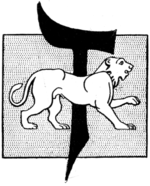Wild Animal Training.
 HE taming of large large wild animals, and their training to jump through hoops and submit to similar ignominies, is a thing which everybody regards with some amount of interest. The triumph of human skill, courage, and will over the immense, lawless brute force which lies in the muscles and sinews of half a dozen full-grown tigers and lions is a fine thing to witness, and has the fascination which all fine things have.
HE taming of large large wild animals, and their training to jump through hoops and submit to similar ignominies, is a thing which everybody regards with some amount of interest. The triumph of human skill, courage, and will over the immense, lawless brute force which lies in the muscles and sinews of half a dozen full-grown tigers and lions is a fine thing to witness, and has the fascination which all fine things have.
The Romans, among a great many other things, were great animal tamers. But animal training among them never rose to large proportions until, ripe and rotten, the Empire was nearing its fall. Then the public became luxuriously blasé, and no longer cared to stare all day at a constant succession of bloody combats in the arena. They were no whit less barbarous in their tastes than their fathers, but they wanted variety and new sensations. Now an old Roman Emperor was always popular so long as he gave his people good shows in the arena, and nothing disrespectful was ever said of a sovereign who provided plenty of fights, of novel features, no matter what else he might do. So that when fights, and nothing but fights, began to wax dull, the people of Rome were treated to performances of trained wild beasts, and, it would seem, to very great performances. The profession of animal tamer became a large one, and of some consideration. Horoscopes exist which were cast in the third and fourth centuries of the Christian era in which prediction is made that the "native" shall become a trainer of tigers and elephants.

"An elephant that could write Greek."
The existence of tame lions and tigers was a circumstance which Roman extravagance soon took advantage of. Mark Antony rode about Rome in a chariot drawn by a pair of lions. Domitian had a lion that accompanied the hunt, and acted as a retriever—a lion that would gambol with hares, and allow the little animals to chase it. Martial wrote a poem in praise of this gentle lion; but an ungentle lion, who hadn't the same educational advantages, broke the front of the cage one day in the arena, and left the Emperor's pet dead. Berenice, Queen of Egypt, too, had a tame lion, which sat at table with her and licked her cheeks: let us hope Her Majesty liked it. But the ladies in those days preferred, as a rule, tame birds to lions; and Pliny tells us that a trained nightingale cost as much as a human slave. But when we read a little more, and find that Mucianus talks of an elephant that could write Greek, we feel a certain want of confidence in these ancients and their stories.
In our own times and in this country wild animal taming has been practised with very considerable success. In the second decade of the present century popular attention was directed to the matter by a performance of certain animals bred by one Atkins. These were hybrid cubs, the offspring of a lion and a tigress, and the exhibition of the happy family at Ducrow's
